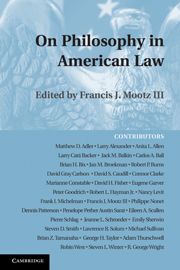Book contents
- Frontmatter
- Contents
- Introduction
- PART I KARL LLEWELLYN AND THE COURSE OF PHILOSOPHY IN AMERICAN LAW
- PART II PHILOSOPHICAL PERSPECTIVES ON LAW
- 7 Toward Normative Jurisprudence
- 8 Critical Legal Theory Today
- 9 Reviving the Subject of Law
- 10 Law and Creativity
- 11 The Stories of American Law
- PART III AREAS OF PHILOSOPHY AND THEIR RELATIONSHIP TO LAW
- PART IV PHILOSOPHICAL EXAMINATIONS OF LEGAL ISSUES
- PART V LAW, RHETORIC, AND PRACTICE THEORY
- PART VI QUESTIONING THE RELATIONSHIP BETWEEN PHILOSOPHY AND AMERICAN LAW
- PART VII COMMENTARIES
- Contributors and Selected Bibliography
- Name Index
- References
9 - Reviving the Subject of Law
Published online by Cambridge University Press: 31 July 2009
- Frontmatter
- Contents
- Introduction
- PART I KARL LLEWELLYN AND THE COURSE OF PHILOSOPHY IN AMERICAN LAW
- PART II PHILOSOPHICAL PERSPECTIVES ON LAW
- 7 Toward Normative Jurisprudence
- 8 Critical Legal Theory Today
- 9 Reviving the Subject of Law
- 10 Law and Creativity
- 11 The Stories of American Law
- PART III AREAS OF PHILOSOPHY AND THEIR RELATIONSHIP TO LAW
- PART IV PHILOSOPHICAL EXAMINATIONS OF LEGAL ISSUES
- PART V LAW, RHETORIC, AND PRACTICE THEORY
- PART VI QUESTIONING THE RELATIONSHIP BETWEEN PHILOSOPHY AND AMERICAN LAW
- PART VII COMMENTARIES
- Contributors and Selected Bibliography
- Name Index
- References
Summary
Legal realism seems to appear much in the recent (U.S.) news. The constitutional law scholar Carl Tobias (quoted in Doyle 2007) recently opined that the high level of 5–4 decisions by the Roberts Court signals that we – or at least they – are all (naive) realists now. Appropriating the realist thesis that judicial decisions are the product of judicial ideology, which in turn informed the critical legal studies perception that “law is politics,” to characterize the emergent jurisprudence of the current iteration of the nation's Constitutional Court, he suggested that the following conclusion is unexceptionable: the Justices do not behave as if law exists; rather, they vote their guts or their prejudices, their political or ideological commitments.
If he is right, the nation's Constitutional Court of final jurisdiction presently manifests an attitude toward making law that has come to characterize the decision making of the federal courts in the half century from Brown v. Board of Education to the post–September 11 constitutional jurisprudence of emergency. Confronted in the early 1960s by burgeoning appeals from prisoners and civil rights plaintiffs, the U.S. Court of Appeals for the Fourth Circuit, based in Richmond, Virginia, the heart of “massive resistance” to desegregation, developed a response to appeals it considered peculiarly burdensome. I have called this practice, now institutionalized nationally in federal and state appellate courts and in federal trial courts, the institutionalized unpublication of judicial opinions.
- Type
- Chapter
- Information
- On Philosophy in American Law , pp. 73 - 80Publisher: Cambridge University PressPrint publication year: 2009



